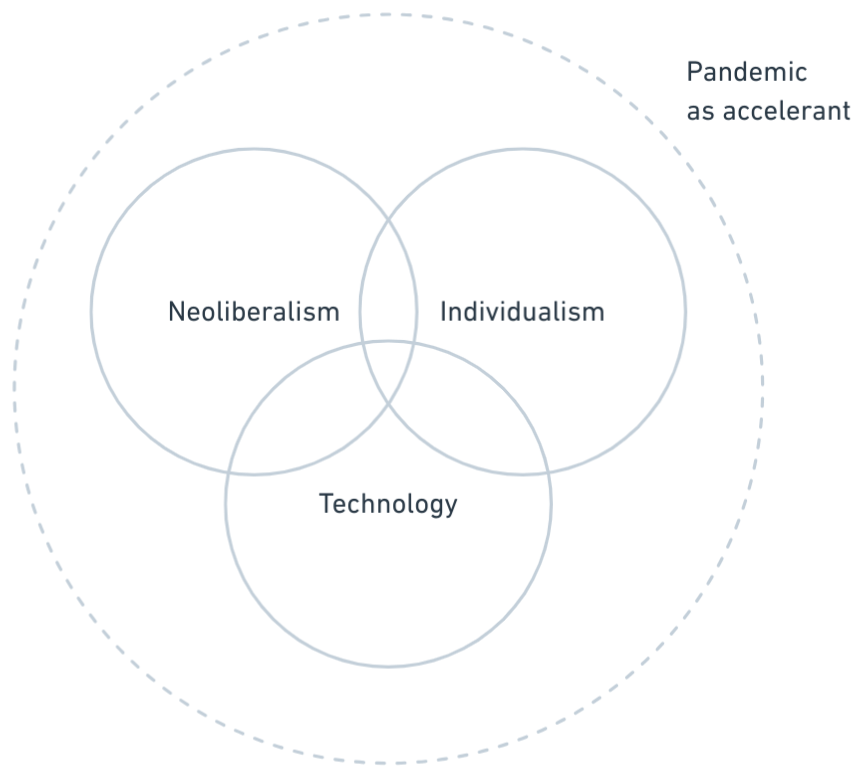TB872: Meta-narrative for my systemic inquiry
Note: this is a post reflecting on one of the modules of my MSc in Systems Thinking in Practice. You can see all of the related posts in this category.

As I’ve already touched upon, my systemic inquiry for my next assessments in this module focuses on WAO has recently started with the Digital Credentials Consortium (DCC) around the adoption of their technology to promote Verifiable Credentials (VCs) in Higher Education (HE).
I’ve been asked to create a ‘meta-narrative’ which is a way of explaining the various narratives within this specific context. It’s the overarching story which provides the backdrop for my inquiry, helping me to understand and explain the complexity of the situation. It includes historical, cultural, political, and social factors that shape the context. These don’t occur in isolation, but rather in terms of the structures, processes, and relationships which form the current state of the system.
This meta-narrative should offer some insights into the dominant beliefs, values, and assumptions, that drive actions and interactions within the system. It should also explore the potential for change within the systems, including leverage points which could influence systemic transformation. Of course, it should also acknowledge the that there are multiple perspectives and experiences, so other stakeholders may have divergent views on the system and its issues.
Oh, and I’ve only got 300 words. Here goes…
According to their website, the mission of the DCC “is to create a trusted, distributed, and shared infrastructure that will become the standard for issuing, storing, displaying, and verifying academic credentials, digitally”. This must be understood in terms of several shifts within society, education, and academia itself, as well as over a decade of history around digital credentials.
The DCC website focuses on the “renewed urgency” of “the question of trusted verification and authentication of learning”. Where does this urgency originate? Why is it “renewed”? Is it due to the explosion of ‘microcredentials‘, which themselves can be seen as a reaction to, and reconceptualisation of, Open Badges?
From my perspective, I’d argue that HE is largely in crisis due to several related forces. Some of these are within the control of the sector, but many are outside it. The first is neoliberalism, the second is individualism, and the third is technology.

Neoliberalism is, in short, the belief that ‘market forces’ are the best way of ensuring personal liberty. Individualism is the related idea that self-reliance and personal independence are paramount virtues. Technology is the application of science, especially in terms of industrial or commercial objectives. Trends in all three areas have been accelerated due to the Covid pandemic, especially in the HE sector as teaching, learning, and assessment had to move entirely online. This has given a new impetus to digital credentialing.
There are people, including members of WAO and staff at DCC included, who work on digital credentials for utopian reasons. For example, an attempt to use them as a way to arrive at a more holistic Open Recognition which allows talents, skills and aspirations to be recognised in ways that can be labelled and defined by individuals, communities, and territories. We imagine a world where everyone is issuing digital credentials to one another.
However, as Stafford Beer noted repeatedly, the purpose of a system is what it does. One could argue that the purpose of HE is survival in a hostile market environment and to provide a means of social reproduction. The latter allows HE institutions to continue to sit at the centre of the credentialing landscape and continue to have hegemonic power. At times, these two purposes may be at odds with one another: for example with HE institutions diversifying their offerings through a range of different ‘sized’ credentials, which could devalue their degrees.
It is into this neoliberal, individualised, technology-infused world that the DCC operates in its promotion of VCs. There are registrars of institutions who are motivated to move slowly, and preserve the reputation of their institution. There are vendors and IT departments who would like to adopt VCs for commercial or technological reasons. And there are funders with different agendas, who seek to either mitigate problems, or accelerate them to achieve a future state.
A chaotic system of digital credentials does not benefit the current major stakeholders in the HE landscape. Their main product, degrees, have an established authority and ‘currency’ in the market. However, they are aware that students (financial considerations), employers (changes in working practices), and competitors (increasing opportunities) are itching for change.
This is therefore a huge opportunity for the DCC. If they can help birth a VC ecosystem based on trusted, open source technology, then the HE sector has the opportunity to diversify the credentials they offer while not being ‘disrupted’ out of existence by commercial vendors. They can also do this under the banner of social equity: widening access to education and achievement.
Well, that’s 561 words, but it will do for now. If I wanted to spend longer, I’d give a bit more context, talk about the regulatory environment HE institutions sit within, and discuss their technical readiness to adopt VC technologies. But I’ll leave if there.
Image: DALL-E 3

